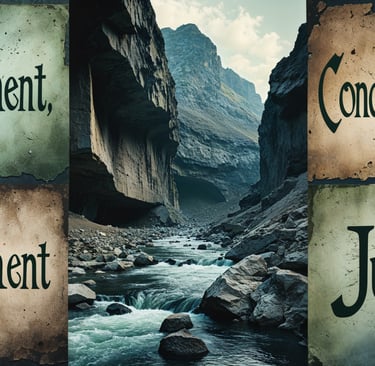The Virtue of Judgement
Discernment in light of Condemnation and Marginalization
4FORTITUDEI - INTUITION, SPIRITUALITY, PHILOSOPHY, RELIGION
The Virtue of Judgment
Discernment in light of Condemnation and Marginalization
In a world increasingly hesitant to make definitive statements about right and wrong, the act of judgment has been cast in a negative light. We are told that to judge is to condemn, to exclude, or to be intolerant. Yet, judgment is not inherently unjust or harmful. It is the process by which we assess reality, distinguish virtue from vice, and navigate the complexities of human interaction. Without judgment, we are left defenseless against deception, moral relativism, and the erosion of principled decision-making.
To judge is not to condemn, nor is it to marginalize. True judgment involves discernment—separating what is good from what is harmful while leaving room for context, understanding, and growth. This article explores why judgment is not only necessary but virtuous and why it must be distinguished from blind condemnation and unjust exclusion.
Judgment as a Moral and Practical Necessity
Judgment is the foundation of wisdom. Every day, we make decisions about people, situations, and actions. We judge whether an investment is sound, whether a person is trustworthy, or whether a behavior aligns with our values. Judgment is not inherently negative; it is an exercise in discernment, a necessary tool for survival and flourishing.
Refusing to judge does not make one more virtuous—it makes one blind. Those who refuse to assess situations or individuals out of fear of appearing judgmental often enable harm, tolerate injustice, and undermine the very moral fabric that holds society together. Judgment, when done properly, is an expression of responsibility and clarity.
The Distinction Between Judgment and Condemnation
Condemnation is the act of passing final, irreversible moral judgment without regard for nuance or redemption. While judgment evaluates actions, condemnation presupposes a fixed moral failure that cannot be undone. This is where the misuse of judgment arises—when it is wielded as a weapon rather than a tool for understanding and justice.
We must recognize that evaluating behavior does not necessitate casting someone out of society. A person’s actions may be wrong, harmful, or misguided, yet they may still possess the capacity for change. The key is to separate the action from the individual, to recognize that judgment should guide, not destroy.
Marginalization: When Judgment Becomes Exclusion
Marginalization differs from judgment in that it is not simply an assessment but an act of exclusion. It is one thing to recognize an action as immoral; it is another to reflexively exile someone from society. True justice requires careful consideration, ensuring that consequences are proportionate and just, not merely punitive.
Exile, social rejection, or punishment should not be reflexive but based on further criteria beyond simple judgment. A society that indiscriminately exiles those who err loses the opportunity for redemption and reform. True moral clarity allows room for discernment and measured responses rather than blind ostracization.
Practical Concepts to Remember and Apply
Judgment is essential for moral clarity and decision-making.
Evaluating an action is not the same as condemning an individual.
True discernment allows for understanding and growth rather than automatic punishment.
Marginalization should not be a reflex but a measured response when necessary.
Judgment should be grounded in virtue, wisdom, and a commitment to truth rather than personal bias or emotion.
Seeking context before rendering judgment prevents rash and unjust conclusions.
Constructive judgment should aim for correction, not mere criticism.
"The greatest kindness we can offer another is the judgment of their virtue and vice, so they may grow in wisdom." – Aristotle
"It is not enough to see the right and the wrong; one must act with justice, which tempers judgment with understanding." – John Locke
Conclusion
To judge is to see clearly, to distinguish truth from falsehood, and to uphold what is just. It is not inherently wrong, nor should it be abandoned out of fear of condemnation or exclusion. Judgment is a virtue, but it must be exercised with wisdom, avoiding the pitfalls of automatic condemnation and reflexive marginalization.
Instead of rejecting judgment, we should reclaim it as a necessary part of moral and social order. Only by doing so can we uphold justice, ensure fairness, and cultivate a society that values both accountability and understanding.




